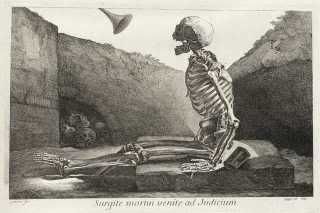 The first half of Advent had been a traditional time when the Church looked toward the "end times" and what will happen when Christ comes again. This focus on the "end" also included an emphasis on death (the Dies Irae that became the traditional Requiem sequence was first the sequence for the First Sunday of Advent). In a disucssion about music and funerals, Neil, who writes at Todd's Catholic Sensibility blog, talks about a recent Advent sermon by Anglican priest and theologian Samuel Wells that discussed three things that heaven is not and three things that heaven is.
The first half of Advent had been a traditional time when the Church looked toward the "end times" and what will happen when Christ comes again. This focus on the "end" also included an emphasis on death (the Dies Irae that became the traditional Requiem sequence was first the sequence for the First Sunday of Advent). In a disucssion about music and funerals, Neil, who writes at Todd's Catholic Sensibility blog, talks about a recent Advent sermon by Anglican priest and theologian Samuel Wells that discussed three things that heaven is not and three things that heaven is.Heaven is not the “continuation of a person’s eternal soul....Can anyone look at Jesus on the cross and say 'death is nothing at all'? Can anyone look at the aftermath of a suicide bombing in a market square and imagine the words 'I have only slipped away into the next room'? Our death is the end of us. Our hope lies not in pretending otherwise, but in knowing that our death is not the end of God.”
Heaven is not “our reabsorption into the infinite....God is wholly absent from this understanding of heaven. Jesus seems to have achieved nothing of any significance in his cross and resurrection, at least as far as our death and life thereafter is concerned. Perhaps the reason that the verses usually entitled 'Death is nothing at all' and 'Do not stand by my grave and weep' have become so enormously popular in our contemporary culture is that they offer pictures of continuity beyond death that require no belief in God or reference to Jesus whatsoever. The trouble is, they do so by denying the reality of death, and the pictures they offer, of heaven as a waiting room or as a disembodied wind, are so bleak as to offer little or no real hope at all.”
Heaven is not the “reconstitution of our fleshly bodies....This is less of a mistake than the first two, and it may sound obvious in an age where cremation of dead bodies is relatively commonplace, but it’s still worth stating. The funeral sermon that says 'I’m sure Peggy’s up there now watering and pruning her roses just as she did down here' seems to be assuming that heaven is basically a continuation of our present physical life in all it prosaic mundanity. To be sure, heaven is a physical existence, but the bodies of the saints are not simply embalmed versions of the ones we have here.”
The problem in common with these three views is that they “lose their credibility when they deny the overwhelming horror of death,” and, then, unsurprisingly, “they lose any sense of wonder when they ignore the overwhelming glory of God.”
So what is heaven?
First, heaven is worship:
“The reason we put so much care and attention into the way we worship at Duke Chapel is because we believe that the way we worship is the most significant way we depict and anticipate the life of heaven. Every Sunday Christians gather together and depict and anticipate the life of heaven. That’s why worship matters so much – because in eternity, that’s all there’ll be. And worship isn’t just some abstract ideal. Everything depends on who we worship. And the book of Revelation makes it absolutely clear who we worship – we worship the Lamb who was slain, the Lamb on the throne, Jesus, the one who gave his life because God loved us too much to leave us to oblivion and obliteration, the one whose resurrection gave us the life of heaven for which we long and on which our hope depends.”
Second, heaven is about friendship:
“The heart of God is three persons in perfect communion. And yet at the table there is a fourth place – a place left for us to join the communion of Father, Son, and Holy Spirit. This is heaven – the experience of being invited to the table of friendship to join the Father, Son, and Holy Spirit. At last we discover, not just what God can do when left to do it on his own, but what is possible when in perfect communion humanity and all creation join the everlasting dance of the Trinity.”
Finally, heaven is a banquet:
“This is maybe the most common picture of all in the New Testament – heaven as a great feast, a banquet celebrating the marriage of heaven and earth, the perfect union or communion of God and all God’s children. Just imagine a fabulous meal where there were no allergies, no eating disorders, no inequalities in world trade, no fatty goods, no gluttony, and no price tag.…We are made friends with God and one another when we eat together in worship. In eating together we recall the transforming meals Christ shared before, during and after his passion, and we anticipate the great banquet we shall share with him.”
Link to Neil's entire post and the full sermon here.
No comments:
Post a Comment